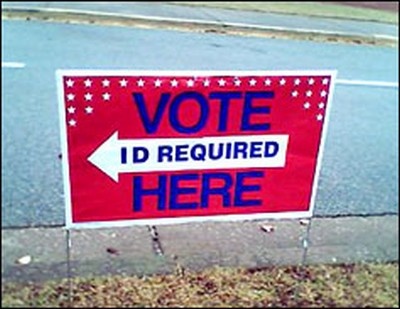How the South Carolina 'dead voters' hoax collapsed

Last month, officials in South Carolina, facing resistance from the Department of Justice to their new voter ID law, concocted a ghoulish tale of dead voters taking over the state's elections.
As was suspected from the beginning, the fevered stories of "zombie voters" turned out to be fantasy. This week, state elections officials reviewed 207 of the supposed 950 cases of dead people voting, and couldn't confirm fraud in any of them. 106 stemmed from clerical errors at the polls, and another 56 involved bad data -- the usual culprits when claims of dead voters have surfaced in the past.
So the question is, how did this cheap B-movie fiction make it into the public debate in the first place?
It started in 2011, when the state legislature passed, and the governor signed, a stringent voter photo ID requirement over the objections of civil rights and voting advocates. An Associated Press investigation found that those at the greatest risk of being disenfranchised were African-American voters, who were more likely to not have the necessary ID.
This helped push the Department of Justice to block South Carolina's law under the Voting Rights Act. As Assistant U.S. Attorney General Thomas Perez wrote in a December 23, 2011 letter:
"[M]inority registered voters were nearly 20% more likely to lack DMV-issued ID than white registered voters, and thus be effectively disenfranchised by" the law's requirements.
Just three weeks later, State Department of Motor Vehicles director Kevin Shwedo, a career military man installed at DMV by GOP Gov. Nikky Haley in 2011, delivered shocking testimony to a S.C. House hearing. He had compared voting records with death records in South Carolina, and found 956 discrepencies.
Shwedo was so alarmed by this discovery that he sent his findings to the State Law Enforcement Division. South Carolina's first-term Republican Attorney General Alan Wilson eagerly took up the case, reporting that his office was investigating the 900-plus cases.
Zombie voter hysteria exploded. The same day as Shwedo's testimony, Lou Dobbs at Fox made it a national sensation, claiming that new research "shows that more than 900 people -- dead people -- appeared to have voted in recent elections in South Carolina."
Fox News -- which had already come to the defense of South Carolina's ID law in early January -- went on to invite Wilson on the show to highlight his claims and featured the story again on their Straight News program.
Back in South Carolina, lawmakers seized on the story as proof of the need for voter ID. Advocates of voting restrictions in states like North Carolina did the same.
But South Carolina's screamer of a democracy horror story began to unravel almost as soon as it began. Curiously, when the State Election Commission asked for the list of supposed zombie voters, the Attorney General's office gave them only six names.
By early February, the election officials were able to confirm all of the voters were legitimate: five were very much alive, and one had voted before dying. Clerical errors were blamed.
But Fox News was undeterred: In a February 14 dispatch, the network was still reporting that more than 900 votes were "stolen" in South Carolina by dead voters.
Even as the story lost credibility, South Carolina officials dug in; analysis of the rest of the cases would surely vindicate their findings.
But the opposite happened: The State Election Commission, which had been strangely left out of Shwedo's evidence-gathering process and had questioned the findings from the beginning, released a report this week [pdf] that was unequivocal in its findings:
In 197 of [the 207 cases examined], the records show no indication of votes being cast fraudulently in the name of deceased voters. Research found each of these cases to be the result of clerical errors, bad data matching, errors in assigning voter participation, or voters dying after being issued an absentee ballot. In 10 cases, the records were insufficient to make a determination.
What about the rest of the cases? As Corey Hutchins of the Columbia Free Times -- who has provided excellent coverage of the story from the beginning -- reports, it would take more than 1,000 employee hours for the small staff of 15 to investigate them all.
Despite the cost and that the conclusion will likely be the same as before, South Carolina Republicans aren't swayed. As NPR reports:
The state attorney general's office in South Carolina said in a statement Thursday afternoon that the question of "dead" voters is still being investigated by the State Law Enforcement Division and that no "final answer to this problem" can be determined until that investigation is concluded.
Tags
Chris Kromm
Chris Kromm is executive director of the Institute for Southern Studies and publisher of the Institute's online magazine, Facing South.
